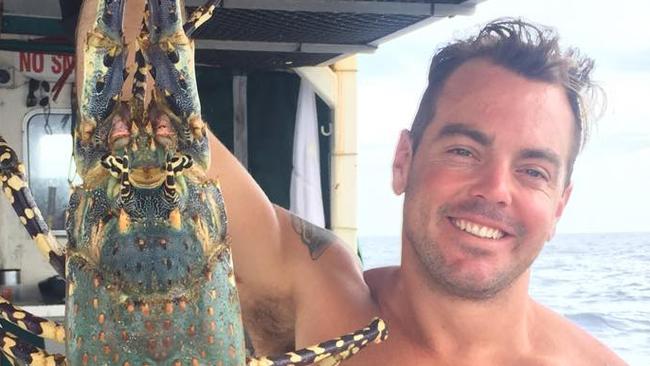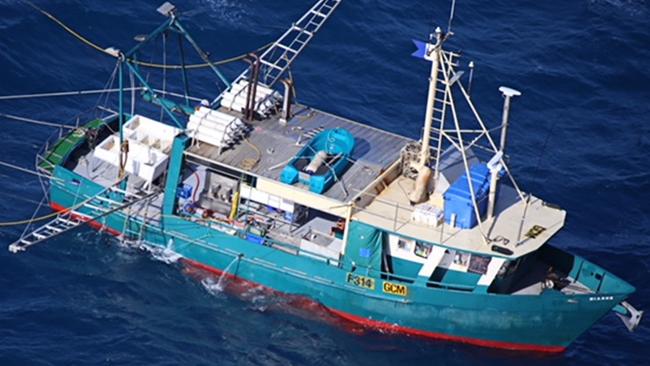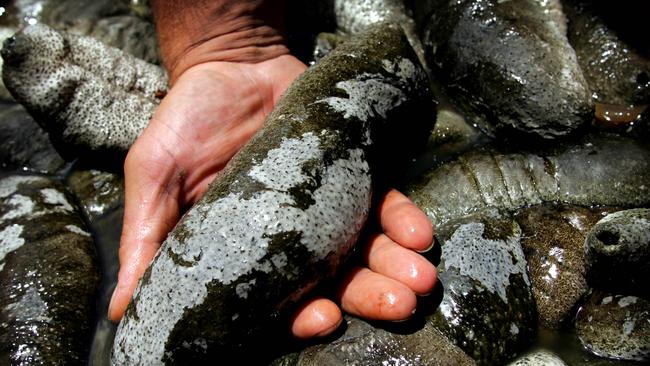Little hope in search for crew of trawler Dianne
Two bodies have been recovered from a fishing vessel that capsized and sank off the Queensland coast with six crewmen on board.

UPDATE: Two bodies have been recovered from a fishing trawler that capsized and sank off the Queensland coast with six crewmen on board.
Police divers have spent most of Saturday making repeated dives to the wreck, which is choked with debris, finding the bodies of two of the missing fishermen. Police have stopped operations for the day but plan to return to the site on Sunday to keep searching for the four other men.
Gladstone Police Inspector Darren Somerville said the two bodies would be brought back to shore to be identified.
“(Police divers) are still clearing debris from the wheelhouse at this stage, and are starting to get below,” Inspector Somerville told reporters in Gladstone.
“There’s a lot of debris including mattresses, fridges freezers, blankets, lifejackets - everything you’d expect to see on the inside of a boat, which makes it extremely difficult for the divers to see.
“It’s not the best scenario, we had hoped to clear the whole vessel today, that hasn’t happened.” Inspector Somerville said the families of the missing men were being kept informed and were understanding of the difficulties facing divers. “Obviously they’re upset and we’ll just see how it goes tonight with identification,” he said.
Police will guard the scene overnight with a 5km exclusion zone. Inspector Somerville said the ship was on the ocean floor about 30 metres down. The depth was also making it difficult for divers, who are only able to spend around 16 minutes on the boat with every dive.
Skipper Ben Leahy, 45, and crew members Adam Hoffman, 30, Eli Tonks, 39, Adam Bidner, 33, Chris Sammut, 34, and Zach Feeney, 28 went missing after the trawler capsized and sank in treacherous conditions near the town of 1770 on Monday night.
Ruben McDornan is the sole known survivor, having managed to get clear of the ship as it sank before being picked up by a passing vessel.
Police used sonar equipment to locate the Dianne about two to three nautical miles off Round Hill Headland on Friday afternoon.
Queensland Premier Annastacia Palaszczuk said the family and friends of the six crewman “remain in our thoughts and prayers”.
LITTLE HOPE IN THE DEPTHS OF DESPAIR
As far as “sluggers’’ go, they were the best of the best, working in a niche industry that netted big money and plenty of adventure.
The close-knit crew members of the Cairns-based trawler Dianne, diving the ocean bed along Queensland’s coast for sea cucumbers, were so good they starred in the recent Discovery Channel series Saltwater Heroes.
But diving for “slugs’’, which can sell for more than $500 a kilo in Asian markets, is a dangerous business.
It appears six of the seven crew paid the ultimate price this week when their 17m steel trawler capsized after a night squall whipped up the sea. The sunken vessel was found last night and police divers expect to reach it tomorrow.
Only one of the crew — known for their professionalism, fitness and grit — survived after clinging to the Dianne’s overturned hull, apparently listening to the cries of his trapped mates before the boat sank.
It had all gone terribly wrong in a matter of hours.

Late on Monday afternoon, the Dianne had set off from the central Queensland sugarcane city of Bundaberg and was steaming north to Gladstone, as part of its eventual journey home to Cairns.
It had been raining hard for days, and forecasts predicted worse to come, but these sea-hardened fishermen — who prided themselves on their seamanship — never doubted they would get through it.
As night fell, the southeasterly 30km/h winds picked up and a low-pressure system whisked the ocean into a frenzy, with waves as high as 4m crashing around the boat.
It was one of these waves that, at about 7.30pm, would flip the boat, entombing the crew below the surface.
They were near Middle Island, about 20km north of the town of 1770, famous for a landing by Captain Cook, when disaster struck.
Ruben McDornan, 32, was not on deck at the time, but somehow avoided being caught inside the upturned boat. He dragged himself onto the hull, hanging on for dear life until it sank at midnight.
The lone survivor was plucked from the ocean by a passing catamaran about seven hours later.
Before the tragedy, the happy, young, fit crew — skipper Ben Leahy, 45, Adam Hoffman, 30, Eli Tonks, 39, Adam Bidner, 33, Chris Sammut, 34, and Zach Feeney, 28 — had been in the middle of a regular slugging trip.
They would dive to depths of up to 30m with hookah lines attached to oxygen tanks on the boat above. Years of experience would help them find their target, which they would pluck from the sea floor and drop into nets by their sides.
The relatively small Queensland beche-de-mer industry brings about $6 million to the state’s economy every year.
Three types of sea cucumber — ranging from 10cm to 50cm — are targeted in the warm tropical waters off Queensland. Most of the dried-out, sausage-like slugs are exported to Asia where they fetch top dollar, especially in China where they are considered a delicacy with aphrodisiac qualities.

On the banks of Cairns’s Trinity Inlet, in an area surrounded by fuel containers and shipyards, lie the piers where the city’s fishing fleet dock and the fisherman meet before heading out to catch their bounty.
It is at this rough dock, smelling of fish and fuel, that the Dianne usually rests.
The blue boat was noticeably absent this week but it was the topic of quiet conversations between dockside regulars. They wondered whether it had an outward-opening door into the quarters below deck. If it did, the water pressure on the flipped boat would have made it nearly impossible to open, experienced fisherman said.
A promotion of an episode from Saltwater Heroes, hosted by former rugby league star and renowned fisherman Andrew Ettinghausen, summed up the experience of the crew.
“Skipper Ben Leahy has logged over 9000 dive hours and in his line of work he’s going to log a whole lot more,” the promo said.
“Sea slugs may not look glamorous, but they fetch top dollar in the Asian markets and Ben and his team have to be at the top of their game to harvest them.
“Sharks, box jellyfish and the bends are just some of the dangers they face, but Ben is known for always being cool and professional in any situation.”
Despite their closeness and expertise, working away from home took its toll on the crew.
At 9am on Monday Tonks posted about his fiance Ana Jameson on her mother’s Facebook page: “Missing her so much. Working away sucks.’’
There are only a handful of beche-de-mer boats operating out of Queensland, where the government sets a yearly quota of about 350 tonnes. About 150 tonnes of that quota has been harvested so far this financial year from the Great Barrier Reef’s 154 rotational zones, each of which can be fished for just 15 days every three years.
Queensland Seafood Industry Association president Keith Harris said imposed restrictions could contribute to fishermen taking risks.
“They may be roamers of the ocean like most fishermen are and they have to travel to where their product may be,” he said. “Sometimes fishermen may have to take more of a risk than they’d like to because they have a limited window.
“If you cop a wave on the wrong side, the reaction time of the boat isn’t as quick as a 14-foot tinny. You might try to do everything you can to keep it upright, but if it hits you the wrong way it is curtains, unfortunately.
“It’s a pretty dangerous industry out there.
“Anyone who has put their foot in a dinghy or stepped on a fishing boat will be feeling this.”
Police conceded yesterday they were now conducting a recovery mission.


